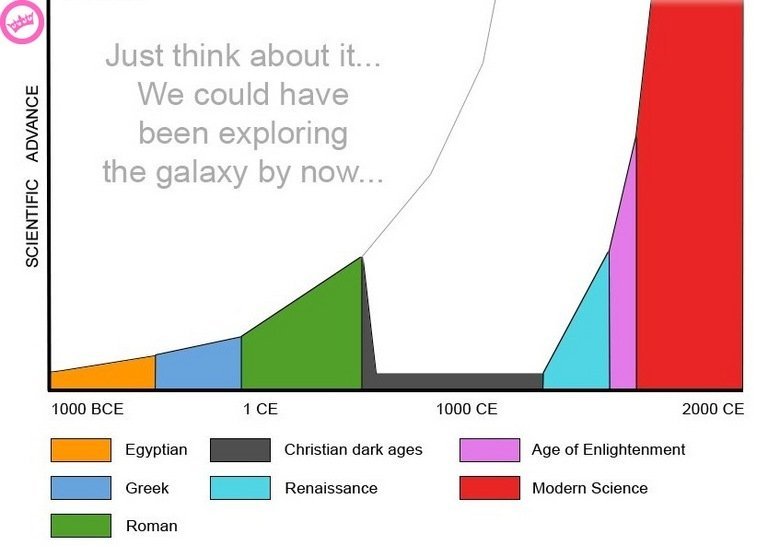Loos like Necronic's reading skills are back to kindergarten level, I see (Hey, its fun to start a rant with an insult, aint it?).
Dark Ages suffered technologically because of catholic rule
is not equal to
you need religion to create an oppressive dictatorial regime
To be fair I didn't mean my comment as an insult, just meaning that you were back doing the point by point wall of texts you used to. Not a criticism, I actually (sort of) appreciate it. And its hard to judge my reading level in this case because I didn't actually read your post (whoops).
But the dark ages and technology is an interesting point that should be explored, because there's a lot of reasons for it and also some interesting reasons why it ended. So, some non-religious reasons for it:
1) Vikings. They were a serious problem. Ironically they stopped being as much of a problem when they started getting converted to christianity. I don't know if this was more due to the religion itself or the building of a central authority/government in Denmark and the rest of Scandinavia that came alongside these conversions.
2) The Plague. The plague isn't really a pro or a con for religion in this age. It just sucked and killed millions repeatedly.
But anyways, on to the end of the dark ages. Which falls around roughly 10-11th century. The causes for this are multifold. The decline of the viking raids is part of it. But, in a weird turn of events, it's arguable that the Crusades were as well.
Due to the feudal system of that time knights would basically just go rob and murder the peasantry whenever they needed money or wanted to get their jollys. The Church did not like this, and came up with a number of pretty weak ideas on how to fight it. One was to create weekly holy days where you couldn't fight. Didn't really work. Another was to instill a sense of nobless oblige. Didn't really work. What did work? Sending the knights off to the middle east to go kill brown people.
Now, this isn't a *good* thing ultimately. It was wrong and immoral. But the church was doing what they could, as a religious institution, to fight against the knighthood, ultimately a secular institution.
But I digress. The main point of the Crusades in ending the Dark Ages (aside from getting the knights to stop killing the peasants) was the "liberation" of old greek texts in Persia that had sat there since the fall of the Library of Alexandria. Reintroducing geometry and other forms of math allowed a very significant technological jump forward for the western world.
Now, to be clear again, I'm not saying the crusades were a *good* thing. But it's a very interesting thing when looking at religion in the past. A religious institution used the crusades as a thin political maneuver to remove secular homeland threats and in the end recovered valuable scientific material from the middle east.
Going even one step further, look at the middle east itself. During this time they were definitely undergoing a golden age. Part of this was due to the rapid expansion of the middle east during the time of Muhammed and soon after. It was a massive religious kingdom. It was also one of the most scientifically advanced kingdoms of its time.
This to me is interesting because it shows that the paradigm of religion vs science vs secularism is an oversimplification of a very complex issue. Only in certain times and in certain minds has the fight ever been so black and white, you are either pro-god or pro-science. Right now I think we are in such a paradigm, but historically that has not always been the case, and by recognizing our potential for other ways of thought we can remove the intolerance on both sides that makes such times so dangerous.

